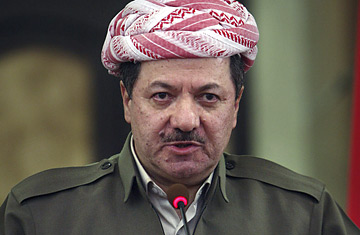
Massoud Barzani, the Kurdish leader of northern Iraq.
For close to two weeks, Turkey has been targeting the guerrillas of the Kurdistan Workers' Party (PKK) inside Iraqi territory. And they are not unhappy with the response of the Americans, who control the skies over Iraq. The Turkish President, according to Turkey's state-controlled media, has praised the United States for providing intelligence that was used by the Turkish military in its operations. America too has backed Turkey's right to go after the PKK, which it has long called a "terrorist organization."
But down in Baghdad, the Americans are not keen to associate themselves with the specifics of Turkey's campaign against the PKK. At a press conference Wednesday spokesmen for the U.S. military and the American embassy repeatedly said that questions about the raids should be asked of the Turkish and Iraqi governments, not the U.S. military in Iraq. Maj. Gen. Kevin Bergner said that American military cooperation with Turkey comes through the U.S.'s European Command; American forces in Iraq are under a separate regional chain of command. Philip Reeker, the U.S. embassy's spokesman, stressed that the raids were "Turkish decisions." He cast the U.S. in the role of observer, saying that it would "continue to watch this situation closely." Over the weekend, U.S. Ambassador to Iraq Ryan Crocker said that defanging the PKK should be done in "a way that does not create problems of instability inside Iraq."
The trickiness of the political climate was apparent earlier in the week, when Iraq's President, who is a Kurd, its Sunni Arab vice president and the leader of the Kurdistan Regional Government (KRG) met in northern Iraq and denounced the Turkish raids. "We condemn operations and they should be ended as soon as possible," said Massoud Barzani, the KRG head. But the condemnation was not as full-throated as it could have been. President Jalal Talibani stressed that Iraqis valued Turkey's friendship, and said that he hoped problems could be addressed through diplomacy.
While the United States walks its tightrope, the Kurds are walking theirs. They are not happy with Turkish incursions. But they are also well aware that shielding the PKK, and provoking Turkey, could risk the autonomy and relative peace Kurds now enjoy within Iraq. Like the Americans, Iraq's Kurdish leaders may simply hope that the Turks finish their raids as quickly — and with as little publicity — as possible.
